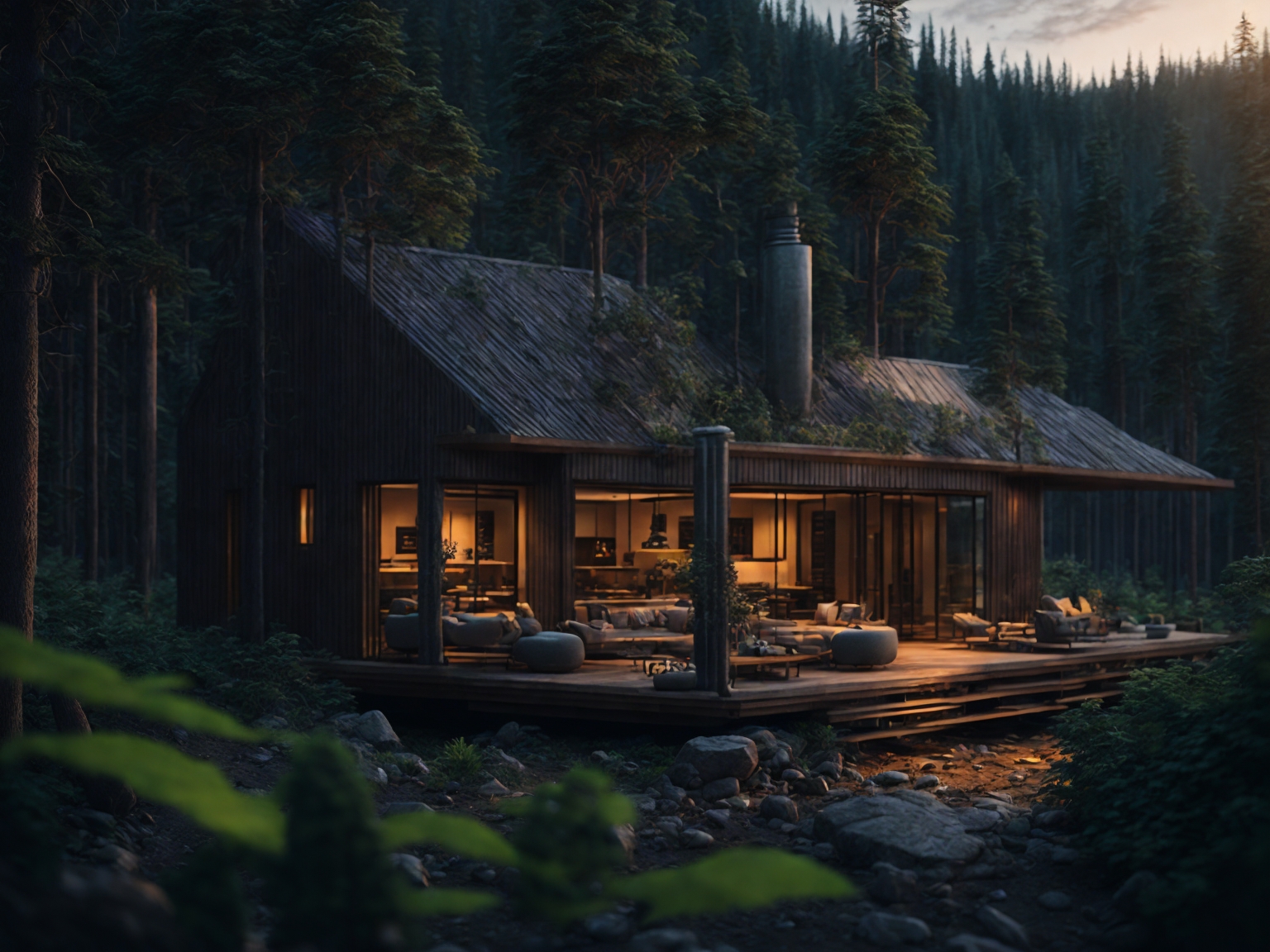
Choosing the Right Location
When it comes to off-grid living, one of the most crucial decisions you’ll make is choosing the right location. Several factors should be considered to ensure a sustainable and comfortable lifestyle.Consider Local Climate and Weather Patterns
Before settling on a location, take the time to research the local climate and weather patterns. Understanding the typical temperature ranges, humidity levels, rainfall, and potential weather extremes will help you make informed decisions about heating, cooling, and water management systems. For example, if you live in an area with long, hot summers, investing in passive cooling techniques and shade structures can make a significant difference in your comfort.Assess Sun Exposure for Solar Panels
Since solar power is a fundamental part of off-grid living, sun exposure is an essential factor to consider. Determine the hours of direct sunlight your potential location receives each day, as this will impact the efficiency and effectiveness of your solar panels. Ideally, you want a location that receives ample sunlight throughout the year to maximize your solar power generation.Evaluate Access to Water Sources
Having reliable access to water is essential for off-grid living. Research the availability of water sources in your potential location, such as wells, springs, or rivers. Consider the distance to these water sources and the effort needed to transport water to your property. If the location relies on rainwater collection, assess the average annual rainfall and storage options to ensure you have an adequate supply.Check for Nearby Resources and Amenities
While the goal of off-grid living is self-sufficiency, it’s still important to consider the proximity to nearby resources and amenities. Being close to local markets, healthcare facilities, schools, and other essential services can make a significant difference in your quality of life. Additionally, having access to nearby forests, lakes, or hiking trails can provide recreational opportunities and a closer connection to nature.
Solar Power Generation
Generating your own electricity through solar power is a cornerstone of off-grid living. To ensure efficient and reliable power generation, take the following steps.Calculate Your Power Needs
Before investing in solar panels, it’s essential to calculate your power needs accurately. Consider the energy consumption of your appliances, lighting, and other electrical devices. This information will help you determine the size of the solar system required to meet your needs. Consulting with a professional solar installer can provide valuable insights and guidance during this process.Invest in High-Quality Solar Panels
Investing in high-quality solar panels is crucial for maximizing your electricity generation. Look for panels with a high photovoltaic efficiency and a solid warranty. While the upfront cost may be higher, the long-term benefits will outweigh the initial investment.Optimize Solar Panel Placement
The placement of your solar panels will directly impact their efficiency. Ideally, panels should be installed on a south-facing roof or in an area with unobstructed sun exposure. Avoid shading from surrounding trees, buildings, or other structures that can block sunlight. Additionally, consider adjustable mounts or tracking systems that can optimize panel angles to maximize energy production.Use Battery Storage Systems
Battery storage systems are an excellent investment for off-grid living. They allow you to store excess energy generated by your solar panels for use during non-sunny periods or at night. Having a reliable battery storage system ensures a continuous power supply, even in adverse weather conditions.Consider Backup Generators
While solar power is the primary source of electricity for off-grid living, it’s always smart to have a backup plan. Backup generators can provide power during extended periods of cloudy weather or when additional energy is needed. Choose a generator that runs on a fuel source readily available in your area, such as propane or diesel.
Water Management
Sustainable water management is crucial for an off-grid lifestyle. Whether you rely on rainwater collection or have access to other water sources, these tips will help you make the most of this precious resource.Collect and Store Rainwater
Collecting and storing rainwater is a practical and eco-friendly way to ensure a reliable water supply. Installing rainwater harvesting systems, such as gutters, downspouts, and storage tanks, can help you capture and store rainwater for later use. Depending on the size of your property and water needs, consider investing in larger storage tanks to minimize the risk of water shortages.Install Efficient Water Fixtures
Conserving water is essential when living off-grid. Install low-flow faucets, showerheads, and toilets to minimize water usage without sacrificing convenience. These fixtures are designed to provide adequate water pressure while significantly reducing water consumption. Additionally, consider using aerators on faucets to further reduce water usage.
Explore Greywater Recycling
Greywater recycling is another excellent water management strategy. Greywater refers to lightly used water from sinks, showers, and washing machines that can be repurposed for irrigation or flushing toilets. Consider installing a greywater system that separates greywater from blackwater and repurposes it for non-potable uses. This not only reduces water waste but also conserves the energy required for water treatment.Implement Water Conservation Methods
Conserving water should become a way of life in an off-grid setting. Embrace water-saving habits such as taking shorter showers, fixing leaky faucets promptly, and only running dishwashers or washing machines with full loads. Water conservation can significantly reduce your overall water usage and increase the longevity of your water supply.Food Production
Growing your own food is not only rewarding but also a vital aspect of off-grid living. Here are some tips to help you establish a sustainable and plentiful food source.Start a Vegetable Garden
One of the most straightforward ways to produce your own food is by starting a vegetable garden. Determine the optimal location on your property that receives sufficient sunlight and has access to water. Begin by cultivating a variety of vegetables suitable for your climate, soil conditions, and personal preferences. As your garden grows, you’ll enjoy the satisfaction of eating fresh, organic produce straight from your backyard.Consider Livestock and Poultry
For a more self-reliant off-grid lifestyle, consider raising livestock and poultry. Chickens are a popular choice for their versatility, providing eggs, meat, and pest control. If you have ample land, consider larger livestock such as goats or cows for milk, meat, or fiber production. Keep in mind that raising animals requires additional space, time, and resources, so plan accordingly.Practice Permaculture Techniques
Permaculture is a sustainable approach to food production that mimics natural ecosystems. By creating diverse and resilient food systems, permaculture maximizes yields while minimizing inputs. Embrace regenerative practices such as companion planting, crop rotation, and mulching to improve soil fertility, increase water retention, and attract beneficial insects. Permaculture principles can be applied to both garden and livestock management, promoting self-sufficiency and sustainability.Preserve and Store Food
To ensure a year-round food supply, it’s crucial to preserve and store excess produce. From canning and fermenting to dehydrating and freezing, there are various methods to preserve food for long-term storage. Investing in quality food storage containers, such as glass jars or vacuum-sealed bags, will help maintain the freshness and nutritional value of your preserved foods.
Waste Management
Minimizing waste and finding sustainable solutions for its management is an essential part of off-grid living. Here are some tips to adopt an environmentally friendly waste management system.Reduce, Reuse, and Recycle
The three Rs – reduce, reuse, and recycle – are fundamental principles of waste management. Reduce waste by being mindful of the products you consume and opting for reusable alternatives whenever possible. Embrace the art of upcycling and repurposing items to give them a second life. Lastly, establish a recycling system to properly dispose of materials that can be recycled.Composting and Vermicomposting
Composting is an excellent way to turn organic waste into nutrient-rich soil for your garden. By collecting kitchen scraps, yard waste, and other compostable materials, you can create a compost pile or use a composting bin. If space is limited, consider vermicomposting with the help of worms. Vermicomposting is a simple and efficient method that converts organic waste into valuable worm castings.Minimize Packaging and Single-Use Items
In an off-grid lifestyle, it’s important to be mindful of the packaging and single-use items you bring into your home. Opt for products with minimal packaging or choose bulk options that minimize waste. Embrace reusable alternatives such as cloth grocery bags, stainless steel water bottles, and silicone food storage bags. By reducing your reliance on disposable items, you significantly decrease your overall waste output.Heating and Cooling Efficiency
Maintaining a comfortable temperature in your off-grid home is essential for year-round comfort. Implement these strategies to enhance the heating and cooling efficiency of your living space.Insulate Your Home
Proper insulation is the foundation of an energy-efficient home. Insulating the walls, floors, and ceilings prevents heat loss during cold months and reduces heat gain during hot months. Invest in quality insulation materials and pay close attention to areas prone to air leaks, such as windows, doors, and electrical outlets. Proper insulation will not only reduce your energy consumption but also increase the overall comfort of your home.Install Energy-Efficient Windows
Windows play a significant role in regulating the temperature inside your home. Replace old, single-pane windows with energy-efficient windows that provide better insulation and reduce heat transfer. Look for windows with low-emissivity (low-E) coatings and double or triple glazing. These features help retain heat in the winter and block unwanted heat during the summer.Opt for Passive Solar Heating
Passive solar heating utilizes the sun’s energy to naturally warm your home. Incorporate passive solar design principles by positioning windows on the south side of your house to maximize heat gain during winter months. Additionally, consider adding thermal mass materials, such as concrete or tile, to absorb and store heat during the day and release it gradually at night. Properly implementing passive solar techniques can reduce reliance on additional heating systems.Utilize Natural Ventilation
Take advantage of natural ventilation to cool your home during hot months. Position windows and doors strategically to promote cross-ventilation, allowing fresh air to circulate and dissipate heat. Install window screens to prevent insects from entering while keeping windows open. Additionally, consider using ceiling fans to enhance airflow and create a comfortable indoor environment without relying on energy-intensive air conditioning.Explore Alternative Heating and Cooling Systems
In off-grid living, it’s essential to explore alternative heating and cooling systems that are compatible with your energy sources. Consider options such as geothermal heat pumps, biomass stoves, or radiant floor heating. While the initial investment may be higher, these systems can provide efficient and sustainable heating and cooling solutions in the long run.Security and Safety
Ensuring the security and safety of your off-grid property is crucial for peace of mind. Implement these measures to protect your home and loved ones.Secure Your Property
A secure perimeter is the first line of defense for your off-grid property. Install sturdy fences, gates, and locks to prevent unauthorized access. Trim vegetation near your property to eliminate potential hiding spots for intruders. Consider using natural barriers like thorny bushes or gravel paths to deter trespassers. Regularly inspect your fencing and make any necessary repairs to maintain the integrity of your security measures.Install Security Cameras and Alarms
Security cameras and alarms provide an additional layer of protection. Install surveillance cameras strategically to cover vulnerable areas of your property, such as entrances, driveways, and outbuildings. Choose cameras with motion detection capabilities and remote viewing options for real-time monitoring. Pair them with alarms that can notify you of any potential security breaches.Prepare for Emergencies
Emergency preparedness is essential for all off-grid dwellers. Stock up on essential supplies such as non-perishable food, water, medications, and first aid kits. Create an emergency plan that includes evacuation routes, designated meeting points, and communication channels. Consider investing in backup power systems, such as generators or solar battery banks, to ensure essential utilities are available during emergencies.Learn Basic First Aid and Self-Defense
Having the knowledge and skills to handle medical emergencies and protect yourself is valuable for off-grid living. Take a first aid and CPR course to learn life-saving techniques. Familiarize yourself with self-defense techniques or consider enrolling in a martial arts or self-defense class. By equipping yourself with these skills, you’ll be better prepared to handle unforeseen circumstances and protect your loved ones.Communication and Connectivity
In today’s digital age, staying connected is essential, even in an off-grid setting. These tips can help you maintain communication and connectivity.Choose Reliable Internet Service Providers
Reliable internet connectivity is vital for various aspects of off-grid living, from remote work and online education to communication with friends and family. Research and choose an internet service provider known for providing stable connections in your area. Consider satellite or wireless internet options if traditional wired connections are unavailable.Invest in Communication Equipment
Invest in reliable communication equipment to stay connected, even without traditional phone lines or cellular service. Satellite phones or radios can be lifesavers during emergencies or when traditional communication channels are unavailable. Keep a fully charged backup power source specifically for communication equipment and regularly test its functionality to ensure it’s ready to use when needed.Set Up Two-Way Radios for Local Communication
Two-way radios are excellent tools for local communication, especially in remote areas without reliable cell phone service. Set up a network of two-way radios within your off-grid community to stay connected and informed about local events, emergencies, or collaborative projects. Establishing designated channels and communication protocols will help maintain clear lines of communication.Financial Considerations
Financial planning is essential for a successful off-grid lifestyle. Consider these factors to ensure a sustainable and manageable financial situation.Calculate and Budget for Costs
Before embarking on the off-grid journey, calculate and budget for the associated costs. Consider expenses such as land purchase or lease, property development, renewable energy systems, sustainable water management infrastructure, and ongoing maintenance. Create a comprehensive budget that accounts for both upfront investments and long-term operational costs.Research Available Tax Incentives
Many governments and local jurisdictions offer tax incentives or rebates for sustainable living practices. Research and understand the available tax incentives in your area that can help offset the costs of renewable energy systems, water management solutions, or other sustainable investments. Consulting with a tax professional can provide valuable insights into potential tax savings.Explore Sustainable Financing Options
If the upfront costs of off-grid living are prohibitive, explore sustainable financing options. Some banks offer specialized loans or financing programs for eco-friendly initiatives or off-grid properties. Look for institutions that prioritize renewable energy or sustainable living and inquire about their financing options. Additionally, consider grants or crowdfunding campaigns that can help fund your off-grid venture.How Can Self-reliance Tips Help with Off-grid Living?
Self-reliance strategies are essential for off-grid living, offering invaluable guidance on how to thrive independently. These tips encompass various aspects like energy generation, water management, and sustainable food sources. By incorporating self-reliance strategies, individuals can confidently navigate the challenges of off-grid living, ensuring a self-sufficient and sustainable lifestyle.
Community Engagement
Embracing community engagement is not only a way to connect with like-minded individuals but also an opportunity to share skills, resources, and knowledge.Connect with Like-Minded Individuals
Seek out and connect with like-minded individuals who share your passion for off-grid living. Attend local sustainability events, workshops, or conferences to meet people who are already living off-grid or aspiring to do so. Building a support network can provide valuable advice, encouragement, and a sense of community.
Participate in Local Self-Sufficiency Groups
Join local self-sufficiency or homesteading groups to connect with individuals who have similar goals and interests. These groups often organize meetings, workshops, or shared resources to help members achieve self-sufficiency. Participating in such groups can lead to collaborative projects, shared knowledge, and friendships with people who understand the challenges and rewards of off-grid living.Share Skills and Resources
Off-grid living thrives on the principles of self-sufficiency and sharing resources. Be willing to share your skills, knowledge, and resources with others in your community. Whether it’s teaching gardening techniques, trading homemade goods, or lending tools, contributing to the community fosters a supportive and resilient environment. In conclusion, off-grid living offers an opportunity to embrace sustainability, self-sufficiency, and a closer connection with nature. By carefully selecting the right location, investing in renewable energy systems, managing resources efficiently, and fostering community engagement, you can create a fulfilling and sustainable off-grid lifestyle.
I’m Alex, the author behind True Survivalist. As a survival enthusiast myself, I’ve created this website to serve as a valuable resource for fellow survivalists and preppers. Whether it’s understanding survival situations, emergency preparedness, or finding the right survival gear, I’ve got you covered. Through a series of informative guides, I aim to provide answers to commonly asked questions, debunk common myths, and help you avoid common mistakes. At True Survivalist, I believe in equipping you with the knowledge and tools you need to be prepared for any survival scenario. Join me on this journey of self-reliance and resilience.
